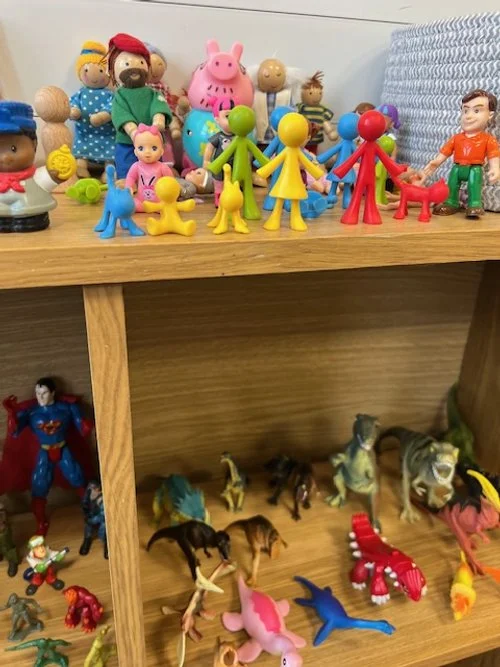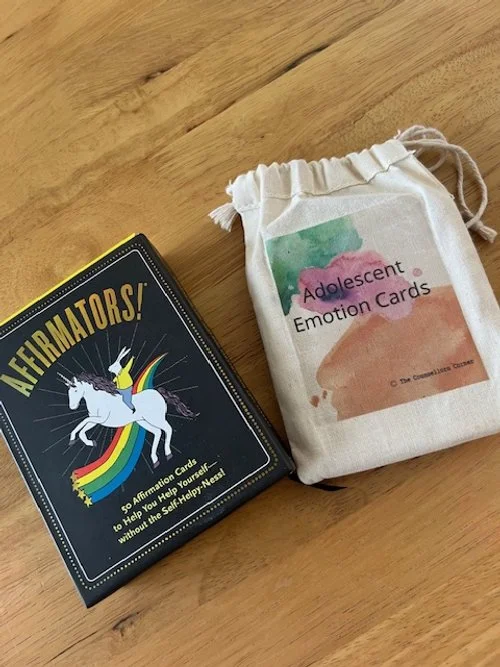Welcome to Slieve Bloom Therapy
At Slieve Bloom Therapy, I support children and teenagers through life’s challenges with warmth, creativity, and evidence-based care.
Based in Ballinasloe, Co. Galway, I serve families across the west of Ireland.
For children aged 4–12, I offer Play Therapy, a gentle, effective way for young people to express themselves, process feelings, and grow in confidence through the language of play.
For pre-teens and teenagers aged 12–19, I combine creative therapies like Sand, Art, and Clay with Mindfulness, and Cognitive Behavioural Therapy (CBT). These approaches help young people explore emotions safely, develop coping skills, and build resilience.
Whatever your child or teen is facing at home, at school, or within themselves, Slieve Bloom Therapy offers a safe space to be heard, understood, and supported.
What is Play Therapy?
Play therapy is an approach in which a trained Psychotherapist who has specialised in Play Therapy, uses the therapeutic powers of play and creativity to assist a child or adolescent who is experiencing persistent difficulty. Play therapy is a form of Psychotherapy. It uses psychological methods, based on regular personal interactions to help a person overcome problems in desired ways. Psychotherapy aims to increase an individual’s well being and mental health, to resolve or mitigate troublesome behaviours, beliefs, compulsions, thoughts, or emotions, and to improve relationships and social functioning.
Hello, and thank you for visiting my website. My name is Ruth Finane, and I am a child and adolescent psychotherapist specialising in Play Therapy. I am passionate about supporting the emotional well-being, development, and resilience of children and teenagers. I know choosing the right therapist for your child is an important decision, so I’d like to share a little about myself, my journey, and how I work with young people.
My Journey into Child and Adolescent Psychotherapy
My journey began when I first completed a therapeutic play skills course. I was fascinated by how play therapy can create real therapeutic change, and this curiosity inspired me to continue my studies. I went on to earn a Bachelor’s degree in Early Childhood Education and Care, followed by a four-year Master’s in Creative Psychotherapy and Play Therapy.
Along the way, I trained and worked in schools, clinics, and community outreach programmes, where I witnessed just how powerful early intervention and compassionate support can be in a young person’s life. I am Garda Vetted and insured, attend regular supervision, and I am an accredited member of the Irish Association for Play Therapy and Psychotherapy (IAPTP).
My Approach to Therapy
Every child is unique, and every family brings its own strengths, culture, and story. My style as a therapist is warm, empathetic, and genuine, always grounded in unconditional positive regard. I draw from a range of evidence-based approaches, including Cognitive Behavioural Therapy (CBT), play therapy, attachment-based techniques, and mindfulness, so that each session is tailored to your child’s individual needs.
I believe children and adolescents flourish when they feel seen, heard, and understood. My aim is to create a safe, non-judgmental space where young people can express their thoughts, feelings, and worries freely. Building trust is central to my work, as I know that a genuine and respectful relationship often provides the foundation for positive change.
-
Play therapy helps children make sense of their world and build the emotional tools they need to thrive. It supports children in:
Building resilience to face life’s challenges
Developing emotionally and reaching their full potential
Understanding their thoughts, feelings, and experiences
Growing in confidence and self-esteem
Recovering from developmental or emotional setbacks
Processing confusing emotions or upsetting events
Communicating at their own pace, in their own way
-
Gain confidence and a stronger sense of self
Reduce anxiety, fear, or emotional overwhelm
Learn to manage their thoughts, feelings, and behaviours
Explore and reprocess difficult or traumatic life experiences
Discover healthier ways to cope and express themselves
Get tailored support for learning difficulties or additional needs
Build a clearer, more secure understanding of the world around them
-
Play is a child’s natural expression so in a child centred session you will see the child playing. Creative psychotherapy is used with adolescents, including sand work, clay, art, visualisations, and mindfulness are used.
• In the playroom the rule is that the child or adolescent can play or be creative in almost any way they want if it is safe.
• There will be a wide selection of toys and creative materials available to the client to use as they wish.
• These allow the client to express him/herself without necessarily using verbal expression.
-
The therapist will draw on their extensive training, knowledge, and experience to:
• Read the play or creative work and draw the client’s attention to their choices, decisions, and actions.
• Note difficulties and stuck places and support any changes the child/adolescent makes in their play or creative work relating to these places.
• Communicate emotional support by giving aware attention.
• Communicate understanding of the client’s thoughts, feelings, and behaviours.
• Support the client in using their symbolic world to show the issue or difficulty and develop and practice changes for bringing into their outside world.
-
The following may be helpful in deciding to choose play therapy as an intervention:
1. A difficulty is persistent.
2. The child shows lack of self-esteem or loss of confidence.
3. The child or adolescent is observed to be struggling with something for a long time or failing to recover from an issue or event including big or small traumas.
4. The child or adolescent appears ‘stuck’ in some way – perhaps cycles of behaviour problems.
5. Relationships are in difficulty.
6. The child or adolescent has become withdrawn / unusually quiet / is acting out aggressively / unable to regulate / or is displaying unusual or persistent changes of behaviour which appear unhelpful / problematic.
7. Reports from school or from other groups indicate problems.
8. A child or adolescent has been assessed as having a difficulty and play therapy/psychotherapy is recommended.
9. A parent wishes to promote their child’s holistic development.
-
When there are difficulties which bring about new life situations, or which are going to become on-going life situations:
• After a traumatic experience
• During or after Separation / Divorce
• Loss – Death – Suicide – Loss of mobility or loss of mobility of a parent
• When being bullied or when bullying
• Illness – Post illness involving the child, a parent or close relative.
• Coping with a special need or organic difficulty
• Needing support for dealing with a developmental delay
• Dealing with emotional or behavioural issues

“Enter into children’s play and you will find the place where their minds, hearts and souls meet.”
“There are many experiences in childhood in which children feel they have little or no control. Play is children’s way of working out balance and control in their lives.”
“ Play Therapy is based upon the fact that play is the child’s natural medium of self-expression. It is an opportunity which is given to the child to ‘play out’ his feelings and problems just as, in certain types of adult therapy, an individual can ‘talk out’ his difficulties.
”
Contact me.
Send me an email or enquire at 0852858752.























